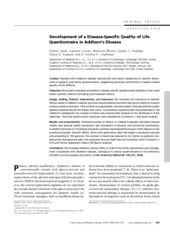| dc.contributor.author | Løvås, Kristian | en_US |
| dc.contributor.author | Curran, Suzanne | en_US |
| dc.contributor.author | Øksnes, Marianne | en_US |
| dc.contributor.author | Husebye, Eystein Sverre | en_US |
| dc.contributor.author | Huppert, Felicia A. | en_US |
| dc.contributor.author | Chatterjee, V. Krishna K. | en_US |
| dc.date.accessioned | 2014-08-21T13:32:43Z | |
| dc.date.available | 2014-08-21T13:32:43Z | |
| dc.date.issued | 2010-02 | eng |
| dc.identifier.issn | 1945-7197 | |
| dc.identifier.issn | 0021-972X | |
| dc.identifier.uri | https://hdl.handle.net/1956/8312 | |
| dc.description.abstract | Context: Patients with Addison’s disease reproducibly self-report impairment in specific dimensions of general well-being questionnaires, suggesting particular deficiencies in health-related quality-of-life (HRQoL). Objective:Wesought to develop an Addison’s disease-specific questionnaire (AddiQoL) that could better quantify altered well-being and treatment effects. Design, Setting, Patients, Intervention, and Outcomes: We reviewed the literature to identify HRQoL issues in Addison’s disease and interviewed patients and their partners in-depth to explore various symptom domains. A list of items was generated, and nine expert clinicians and five expert patients assessed the list for impact and clarity. A preliminary questionnaire was presented to 100 Addison’s outpatients; the number of items was reduced after analysis of the distribution of the responses. The final questionnaire responses were assessed by Cronbach’s and Rasch analysis. Results and Interpretation: Published studies of HRQoL in Addison’s disease indicated reduced vitality and general health perception and limitations in physical and emotional functioning. In-depth interviews of 14 patients and seven partners emphasized the impact of the disease on the emotional domain. Seventy HRQoL items were generated; after the expert consultation process and pretesting in 100 patients, the number of items was reduced to 36. Eighty-six patients completed the final questionnaire; the responses showed high internal consistency with Cronbach’s 0.95 and Person Separation Index 0.94 (Rasch analysis). Conclusions: We envisage AddiQoL having utility in trials of hormone replacement and management of patients with Addison’s disease, analogous to similar questionnaires in GH deficiency (AGHDA) and acromegaly (AcroQoL). | en_US |
| dc.language.iso | eng | eng |
| dc.publisher | Endocrine Society | eng |
| dc.relation.ispartof | <a href="http://hdl.handle.net/1956/8326" target="blank">Glucocorticoid Treatment and Quality of Life in Addison’s disease</a> | eng |
| dc.title | Development of a Disease-Specific Quality of Life Questionnaire in Addison’s Disease | en_US |
| dc.type | Peer reviewed | |
| dc.type | Journal article | |
| dc.description.version | publishedVersion | en_US |
| dc.rights.holder | Copyright 2010 by The Endocrine Society | |
| dc.identifier.doi | https://doi.org/10.1210/jc.2009-1711 | |
| dc.identifier.cristin | 339396 | |
| dc.source.journal | Journal of Clinical Endocrinology and Metabolism | |
| dc.source.40 | 95 | |
| dc.source.14 | 2 | |
| dc.source.pagenumber | 545-551 | |
